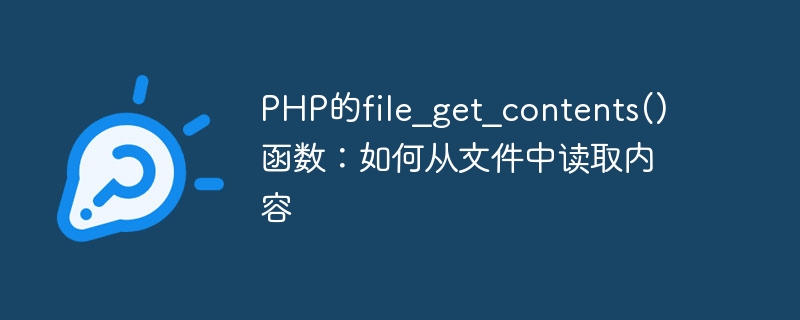

PHP's file_get_contents() function: How to read content from a file, specific code example
In PHP, file_get_contents() is a very useful function, It allows us to read content from files. Whether reading a text file or reading content from a remote URL, this function can easily complete the task.
Syntax
The basic syntax of this function is as follows:
string file_get_contents ( string $filename [, bool $use_include_path = FALSE [, resource $context [, int $offset = -1 [ , int $maxlen ]]]] )
Parameter description
Return value
The file_get_contents() function will return the read content, and return FALSE on failure.
Example-1: Reading local files
The following code demonstrates how to use the file_get_contents() function to read contents from a local file:
<?php
$filename = 'test.txt';
$content = file_get_contents($filename);
if ($content !== false) {
echo "文件内容:
".$content;
} else {
echo "无法读取文件内容。";
}
?>In the above example , we pass test.txt as the file path to the file_get_contents() function. If the reading is successful, the contents of the file will be output; if the reading fails, a message that the file contents cannot be read will be displayed.
Example-2: Reading remote URL
The following code demonstrates how to use the file_get_contents() function to read content from a remote URL:
<?php
$url = 'http://www.example.com';
$content = file_get_contents($url);
if ($content !== false) {
echo "URL内容:
".$content;
} else {
echo "无法获取URL内容。";
}
?>In the above example , we used an example URL. If the read is successful, the content of the URL will be output; if the read fails, a message that the URL content cannot be obtained will be displayed.
Further processing
After using the file_get_contents() function to read the content, we can use other functions to process the content. For example, we can use the file_put_contents() function to write the contents to a new file, or use regular expressions to match and replace.
<?php
$filename = 'test.txt';
// 读取文件内容
$content = file_get_contents($filename);
if ($content !== false) {
// 在文件内容中查找指定字符串,并替换为新的字符串
$newContent = str_replace('old', 'new', $content);
// 将新的内容写入新文件
$newFilename = 'new_test.txt';
file_put_contents($newFilename, $newContent);
echo "新文件已创建并写入新内容。";
} else {
echo "无法读取文件内容。";
}
?>In the above example, we first read the contents of the test.txt file and used the str_replace() function to replace the 'old' string with a 'new' string. Then, use the file_put_contents() function to write the new content into the new file new_test.txt.
Summary
By using PHP’s file_get_contents() function, we can easily read content from a local file or a remote URL. We can further process the read content and operate as needed. Whether reading a file or reading a URL, it can be quickly implemented using the file_get_contents() function.
The above is the detailed content of PHP's file_get_contents() function: How to read contents from a file. For more information, please follow other related articles on the PHP Chinese website!